Best Hay for Guinea Pigs: The Ultimate Guide to a Healthy Diet
In this blog, we are going to answer the question that many guinea pig owners have which is "What is the best hay for guinea pigs?" so happy reading!.
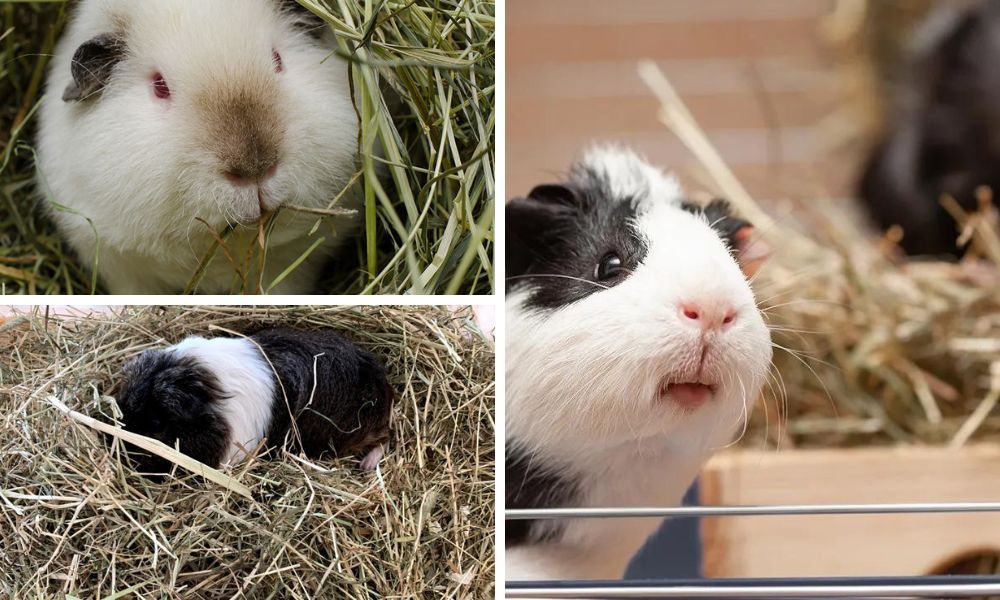
Introduction to Guinea Pig Nutrition
Guinea pigs are herbivores and require a high-fiber diet to stay healthy. A guinea pig’s diet should consist of a variety of hay types, including timothy hay, alfalfa hay, and meadow hay. Hay is essential for a guinea pig’s digestive health and helps maintain their teeth. As a guinea pig parent, it’s crucial to provide your pet with the best hay for guinea pigs to ensure their overall health and happiness. Guinea pigs have different nutritional needs at various stages of their life, and their diet should be adjusted accordingly. For example, adult guinea pigs require a diet rich in fiber and low in protein, while younger guinea pigs may require more protein to support their growth.
Key Takeaways:
- Understanding the importance of hay in a guinea pig's diet is crucial for their health.
- Different types of hay offer varied nutritional benefits suitable for different stages of a guinea pig's life.
- Proper storage and presentation of hay can enhance its benefits and prevent health issues.
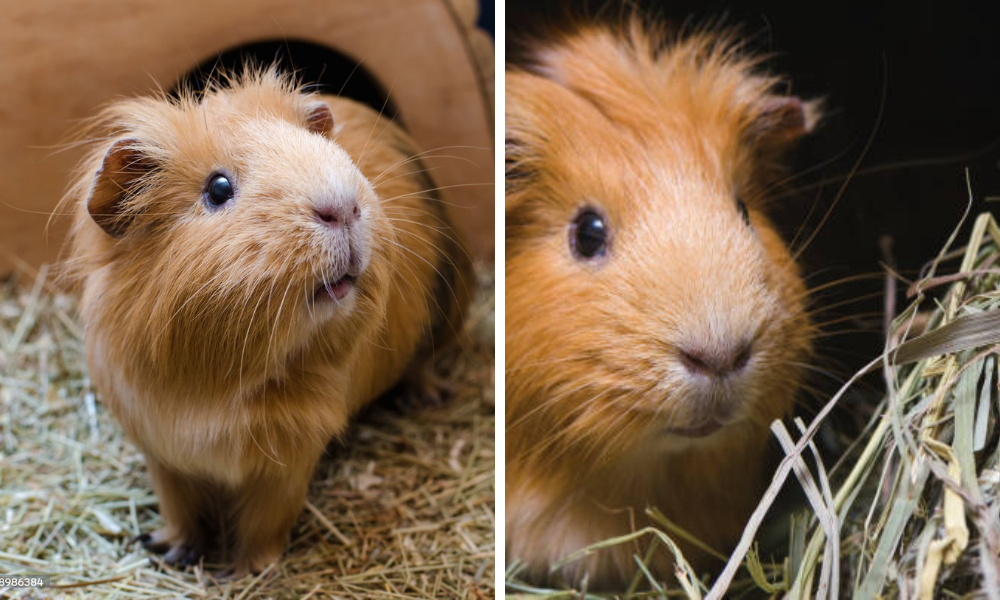
The Essential Role of Hay in a Guinea Pig's Diet
Hay for guinea pigs isn’t just a dietary staple; it’s the cornerstone of their health. A guinea pig’s diet should be hay-centric, with fresh hay available to them at all times. Not only does it provide the necessary fiber for their digestive system, but it also plays a critical role in dental health. The constant gnawing on hay helps wear down a guinea pig’s teeth, which continuously grow throughout their life.
Guinea pigs might need time to assess new types of hay, and mixing new hay with familiar ones can help them adjust comfortably.
Why Timothy Hay Reigns Supreme
Timothy hay is often hailed as the best hay for most guinea pigs. Its high fiber content, balanced nutritional value, and minimal dust make it an excellent choice for adult guinea pigs. The sweet smell and tasty seed heads of timothy grass are irresistible to many guinea pigs, ensuring they eat enough to maintain a healthy digestive system.
Alfalfa Hay: A Controversial Choice
Alfalfa hay, a legume hay, is richer in protein and calcium than other grass hays. While it's beneficial for young, pregnant, or nursing guinea pigs, it can lead to health issues like bladder stones in adults due to its high calcium content. Adult guinea pigs should have alfalfa hay only as an occasional treat, not as a mainstay in their diet.
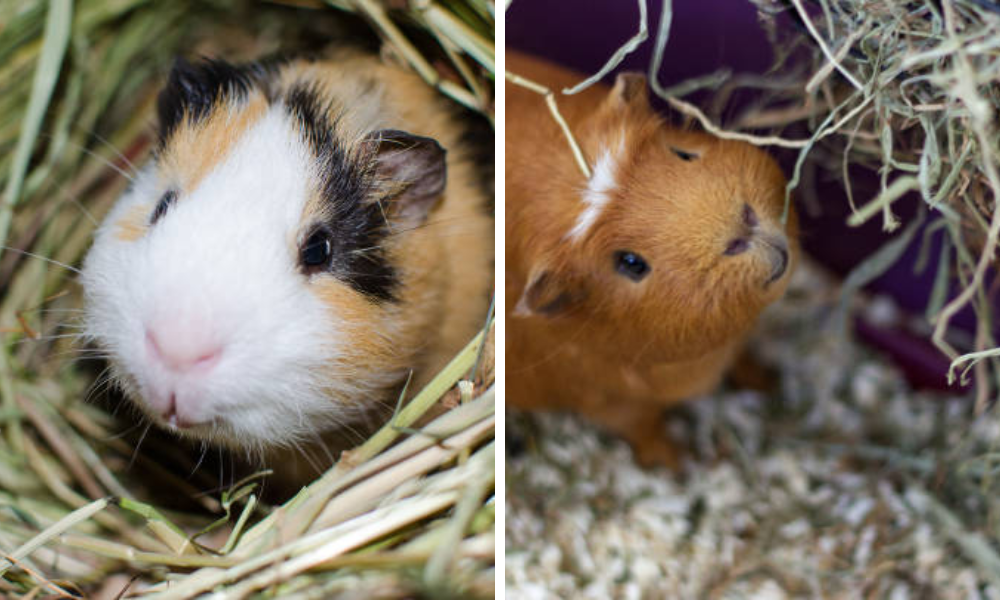
The Benefits of Meadow and Orchard Hay
Meadow hay and orchard grass hay are excellent alternatives to timothy hay. They offer a good balance of fiber and nutritional content, with a soft texture that guinea pigs love. Orchard hay consists of softer leaves that are sweeter, while Botanical Hay consists of Western Timothy Hay combined with additional safe aromatics. These hay types are also known for having a sweet smell and a variety of grasses and other plants, providing a diverse diet for your little friend.
Oat Hay: A Tasty Addition
Oat hay, with its crunchy stalks and tasty seed heads, can be a great addition to your guinea pig's diet. It's best served mixed with other hay types to ensure a balanced diet. Oat hay's unique texture can provide a different chewing experience, which is beneficial for tooth development and dental health.
The Importance of Fresh and Dust-Free Hay
Fresh hay should be green, smell sweet, and be free from mold and excessive dust. Dusty hay can cause respiratory issues, while stale or moldy hay can lead to digestive problems. Always check the quality of hay before offering it to your guinea pig to ensure their health and well-being. The freshness of hay is crucial for the health and well-being of guinea pigs, and fresh hay should be hand-selected and sourced directly from farmers.
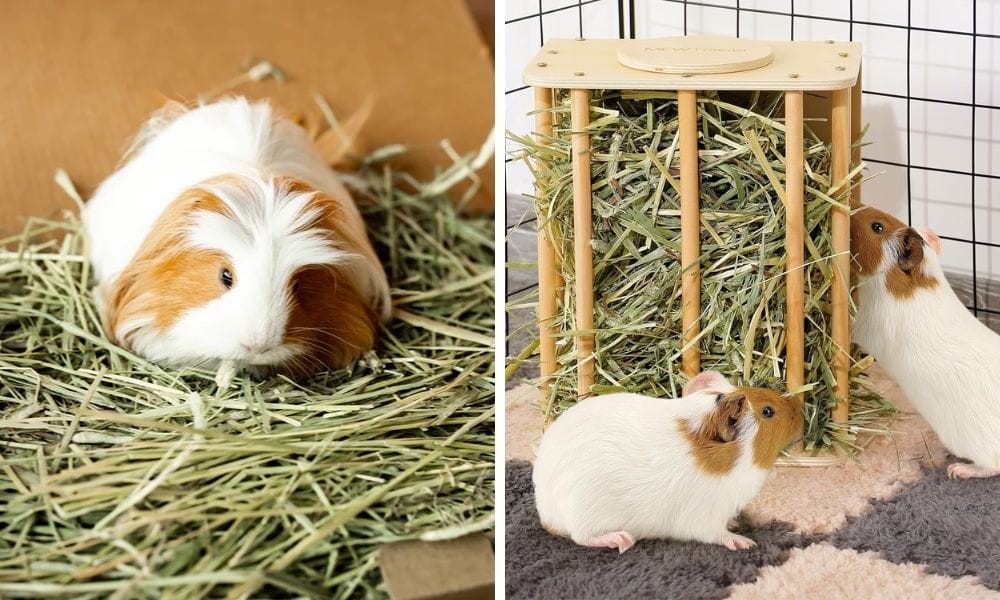
How Much Hay Do Guinea Pigs Eat?
Guinea pigs eat a surprising amount of hay daily. They should have unlimited access to hay, as it's essential for their constant chewing needs. The amount of hay guinea pigs consume can vary, but it's typically around their body size in hay each day.
The Role of Hay in Weight Management
Hay plays a significant role in weight management for guinea pigs. A diet high in hay can prevent obesity, as it's low in calories and high in fiber, which keeps them full longer. Conversely, a lack of hay can lead to weight gain and associated health issues.
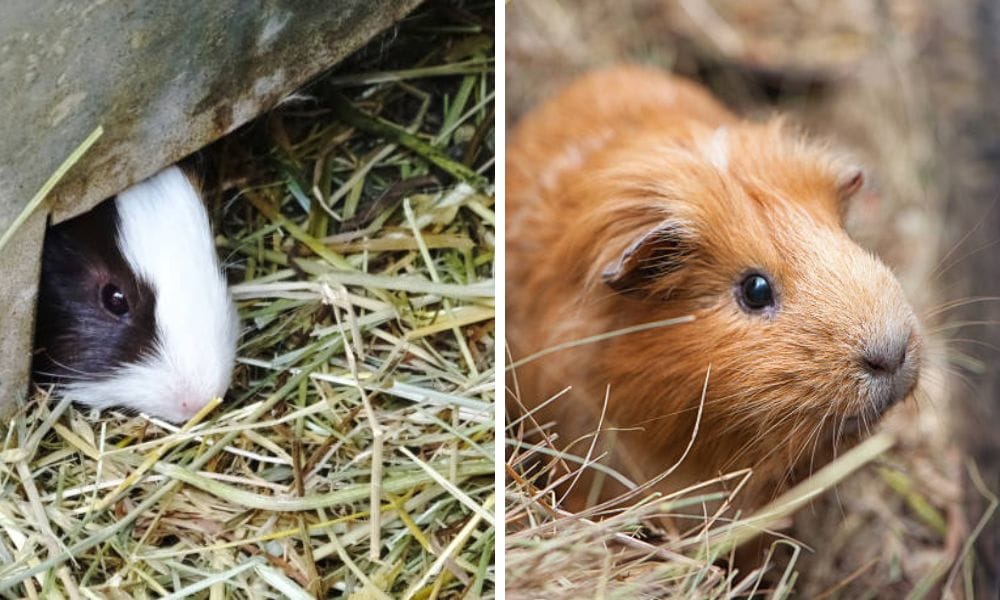
Hay and Vitamin C: A Vital Combination
While hay is vital for a guinea pig's diet, it doesn't contain vitamin C, which is essential for their health. Guinea pigs cannot produce vitamin C on their own and require it in their diet to prevent conditions like scurvy, characterized by symptoms like delayed wound healing and a runny nose. Ensure your guinea pig also receives vitamin C through vegetables or supplements.
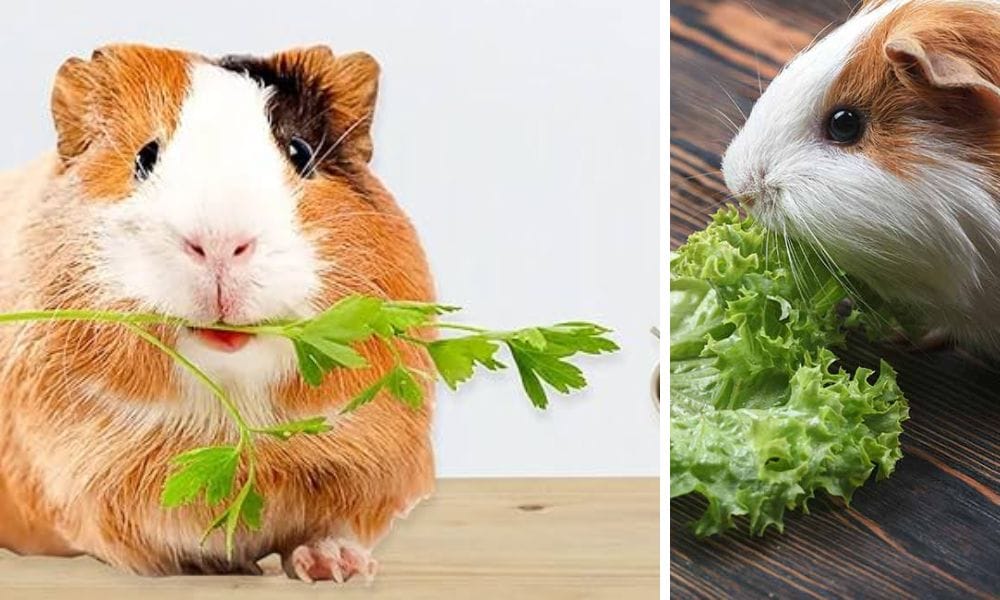
The Connection Between Hay and Dental Health
The act of eating hay helps maintain a guinea pig’s dental health. Their teeth grow continuously, and chewing on hay helps wear them down naturally. The fibrous nature of certain types of hay, like Timothy Hay and Meadow Hay, is crucial for wearing down a guinea pig's teeth and preventing dental issues. Without hay, guinea pigs can suffer from overgrown teeth, which can lead to difficulty eating and severe health issues.
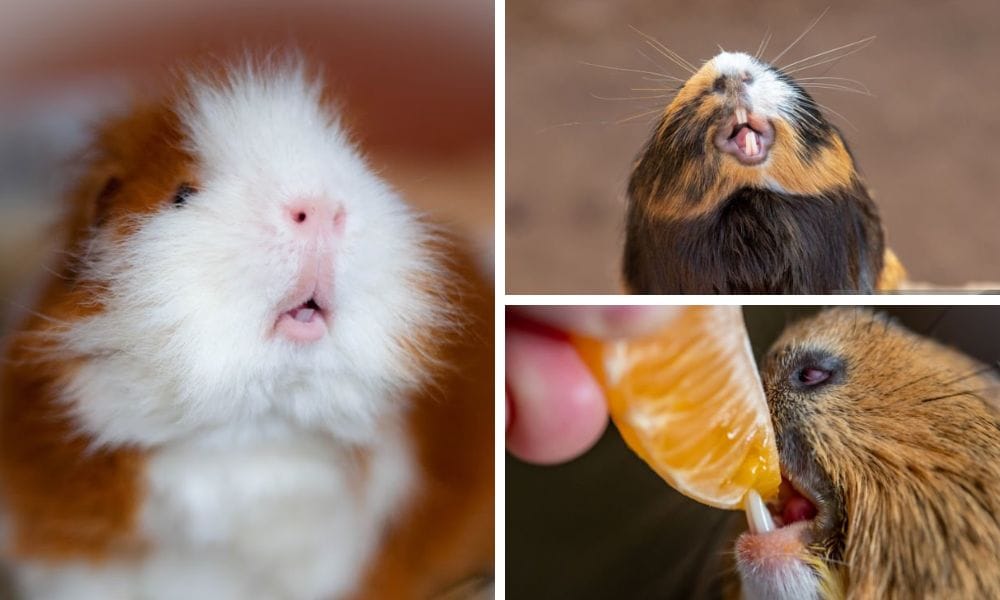
The Nuances of Legume Hays in a Guinea Pig's Diet
When it comes to guinea pig hay, not all types are created equal. Legume hays, such as alfalfa, are often discussed in the context of a guinea pig diet, especially for their higher protein and fat content. These hays are denser in calories and can be beneficial for certain life stages, like juveniles who require more energy for growth, or for guinea pigs that are pregnant or nursing. However, for the average adult guinea pig, the excess calories can lead to weight gain and may contribute to abnormal bone growth due to the higher calcium content.
On the flip side, legume hays should be approached with caution for adult guinea pigs. The high calcium content, while beneficial in small doses, can predispose these small pets to urinary issues if fed in excess. It's crucial to balance their diet with grass hays that have a more suitable fat content and calcium-to-phosphorus ratio for maintaining optimal guinea pig health. If you're considering legume hays, it's best to use them as a supplement rather than the staple of your guinea pig's diet, and always consult with a veterinarian to ensure it aligns with your pet's specific health needs.
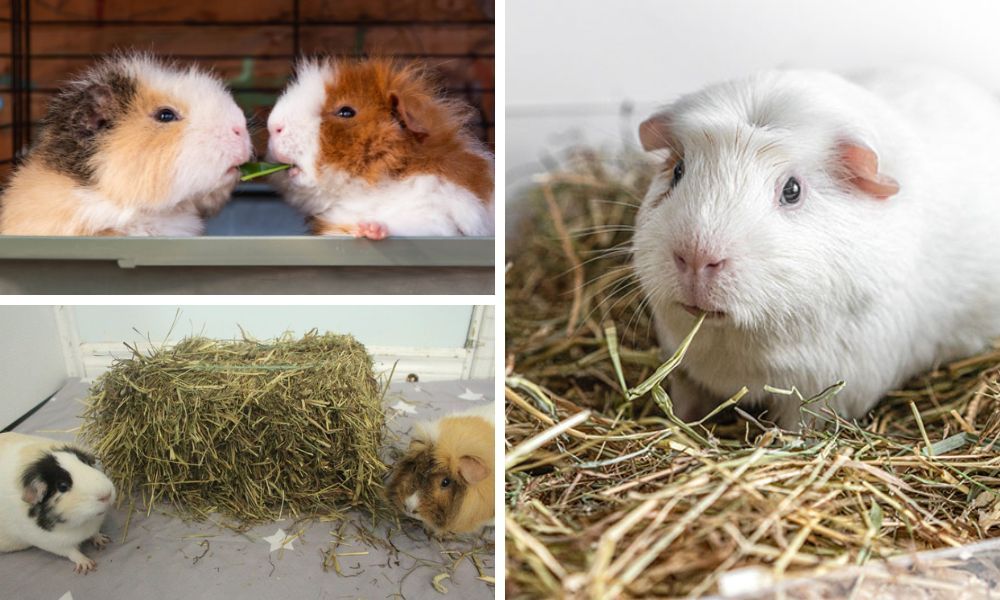
Hay Varieties and Guinea Pig's Health
When considering a guinea pig’s diet, the variety of hay offered can have significant implications for their overall health. Not all hays are created equal, and each type brings a unique set of nutrients and benefits. For instance, while Timothy hay is rich in fiber and low in protein, making it ideal for daily consumption, other hays like alfalfa are higher in calcium and protein, which can be beneficial for younger guinea pigs or those that are pregnant. However, for adult guinea pigs, excessive calcium can lead to health issues such as bladder stones. It’s crucial to balance the types of hay to ensure your guinea pig’s health remains optimal.
It is also important to understand the difference between bedding hay and feeding hay, as each type serves a unique purpose and should be kept separate for hygiene and safety reasons. Bedding hay provides a comfortable and absorbent layer for guinea pigs to rest on, while feeding hay is specifically chosen for its nutritional content.
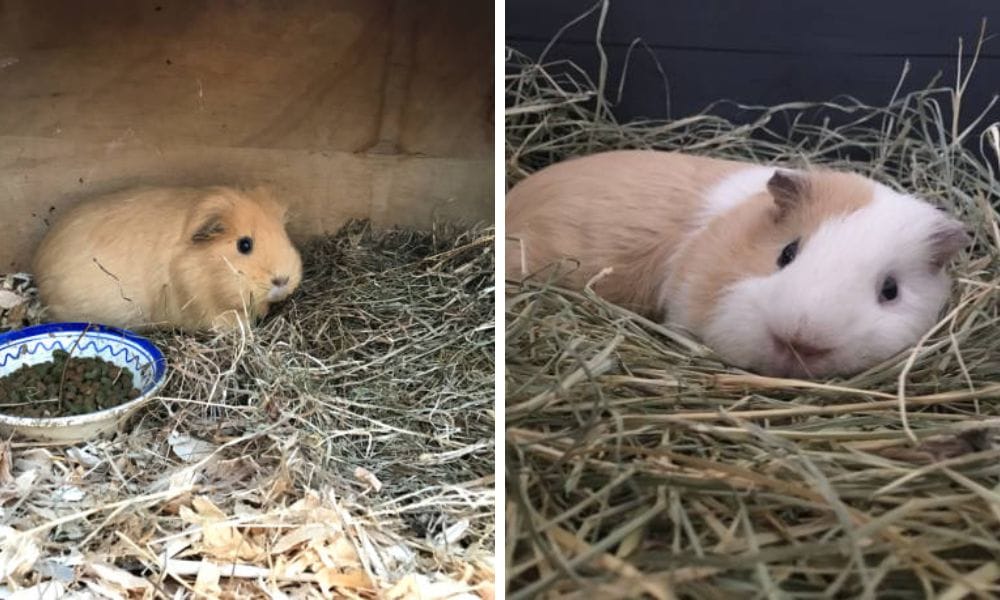
In addition to nutritional content, the physical texture of different hays can influence a guinea pig’s teeth. Chewing on hay helps guinea pigs wear down their constantly growing teeth, preventing dental problems. Coarser hays like Timothy and Orchard hay are excellent for dental health, as they require more chewing. This natural filing process is essential, as overgrown teeth can lead to difficulty eating and severe health complications. By providing a variety of hays, you not only cater to your guinea pig’s nutritional needs but also to their dental health, ensuring a happy and healthy pet.
The Importance of Water and Hay for Guinea Pigs
While hay is the cornerstone of a guinea pig's diet, fresh water is equally important for maintaining a guinea pig's health. Fresh water aids in digestion and helps flush out toxins from the body. It's vital to ensure that your guinea pig has access to clean, fresh water at all times, especially if their diet is high in dry foods like hay. Make sure to use appropriate food bowls or hay racks. Water consumption can vary depending on the size of the guinea pig, the temperature of their environment, and their diet. Monitoring your guinea pig's water intake can also be an indicator of their overall health, as changes in drinking habits may signal potential health issues.
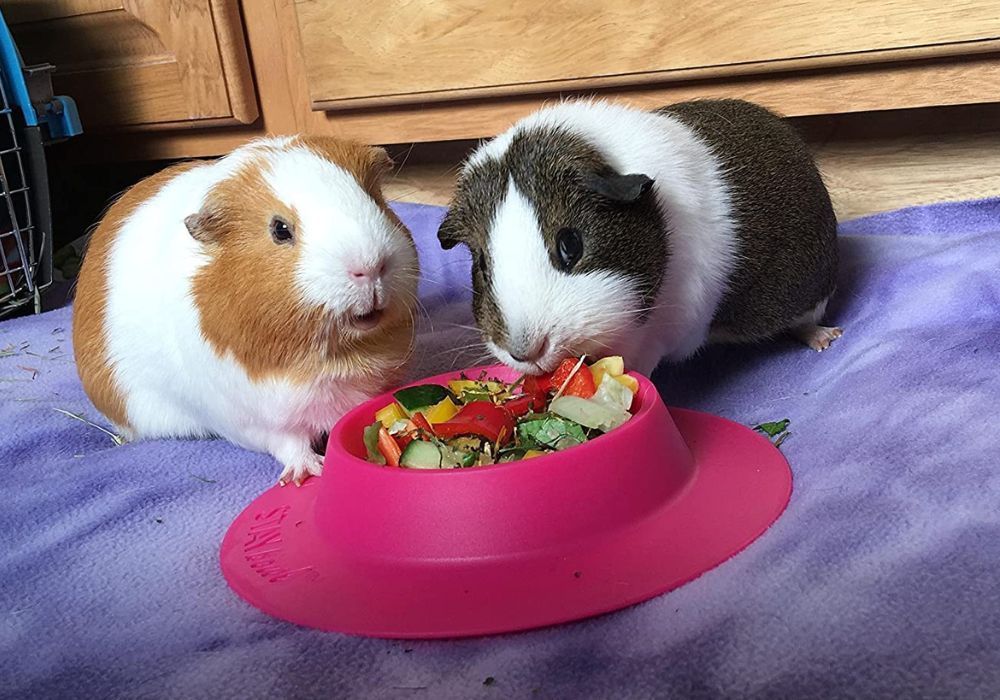
It's also worth noting that while guinea pigs share some dietary requirements with larger animals, such as the need for high-fiber hay, their smaller size and unique physiology mean their needs are quite specific. Larger animals may tolerate a wider range of hays and nutritional compositions, but guinea pigs require a careful balance to prevent obesity and other health problems. By understanding the specific needs of guinea pigs, owners can ensure their furry friends receive the right mix of hay, fresh water, and additional nutrients to thrive.
The Importance of Seed Heads in Guinea Pig Hay
Seed heads in guinea pig hay are like hidden treasures for your furry friends. Not only do they provide a delightful crunch that guinea pigs adore, but they also contribute to the overall nutritional value of the hay. Seed heads are packed with fiber, which is essential for a guinea pig's digestive health. They also encourage natural foraging behavior, keeping your guinea pig engaged and entertained during meal times. This can be particularly important for guinea pigs living in captivity, as it mimics the foraging they would do in the wild and helps prevent boredom.
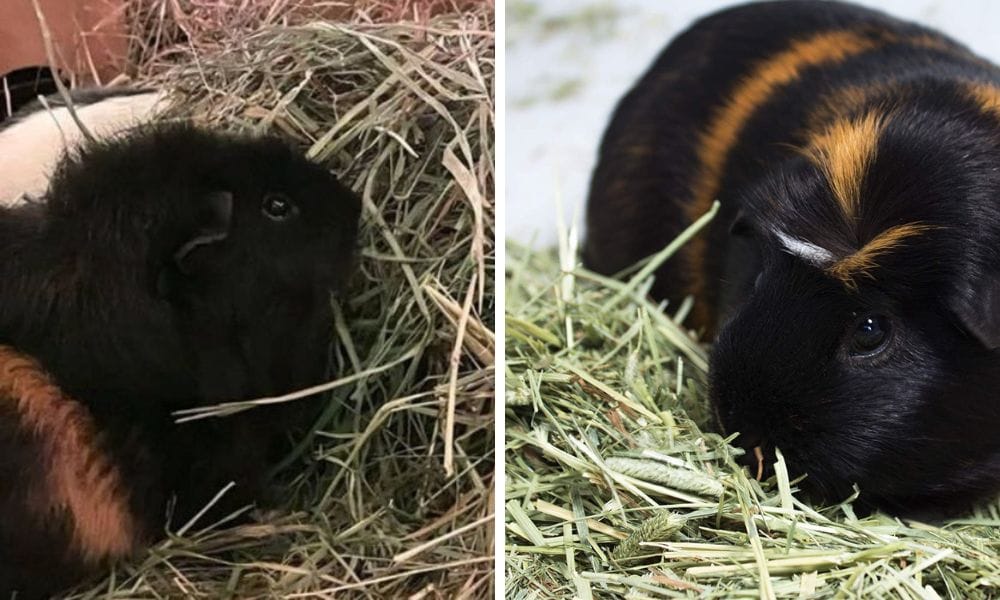
However, it's important to note that while seed heads can be a healthy part of a guinea pig's diet, they should not be the main focus. Overindulgence in seed heads can lead to a diet too high in calories and fat, which might result in a guinea pig losing weight or developing a weakened immune system. Good quality hay for guinea pigs should have a balance of leaf to seed head, ensuring that your pet gets the right mix of nutrients without overdoing it on the fat content. Always ensure that the hay you provide is dust free and fresh, as this will help maintain your guinea pig's health and happiness.
Hay and Digestive Health: An Indispensable Link
A guinea pig's digestive system is designed for a high-fiber diet, and hay provides the perfect balance of nutrients and fiber. This aids in regular digestion and helps prevent issues like GI stasis, a potentially life-threatening condition where the digestive system slows down or stops.
Choosing the Right Hay for Your Guinea Pig
When selecting hay for guinea pigs, consider their age, health, and dietary needs. Young and growing guinea pigs, as well as pregnant or nursing ones, may benefit from the higher protein and calcium content of alfalfa hay. In contrast, adult guinea pigs thrive on grass hays like timothy, meadow, or orchard hay.
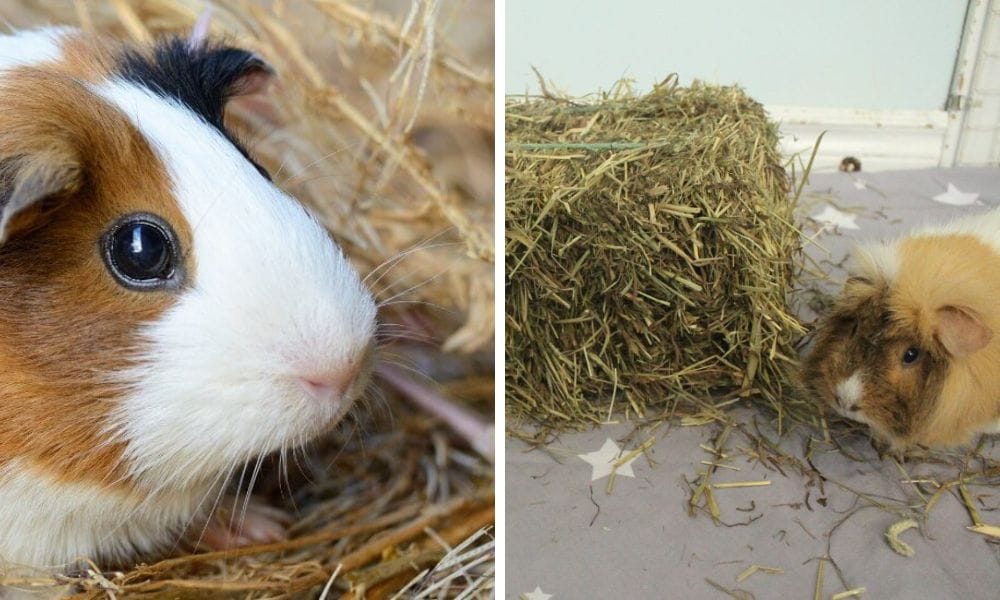
Guinea Pig Hay Products
There are various guinea pig hay products available in the market, including timothy hay, alfalfa hay, and orchard hay. Each type of hay has its unique nutritional value and benefits for guinea pigs. Timothy hay is a popular choice among guinea pig owners due to its perfect balance of fiber, protein, and fat. Alfalfa hay, on the other hand, is higher in protein and calories, making it suitable for younger guinea pigs or those that need to gain weight. Orchard hay is a good option for guinea pigs that prefer a softer and sweeter hay. When choosing a hay product for your guinea pig, it’s essential to consider their individual needs and preferences. You can also mix different types of hay to provide a varied and nutritious diet for your pet.
Storing Hay Properly to Retain Nutritional Value
Proper storage of hay is essential to maintain its nutritional value and prevent spoilage. Keep hay in a cool, dry place away from direct sunlight. Hay should be stored in a way that allows air circulation to prevent mold growth, which can be harmful to your guinea pig’s health. Additionally, it is beneficial to keep a bag of Botanical Hay in your supplies for both enrichment and first aid purposes, as it can entice pets who may be picky or unwell.
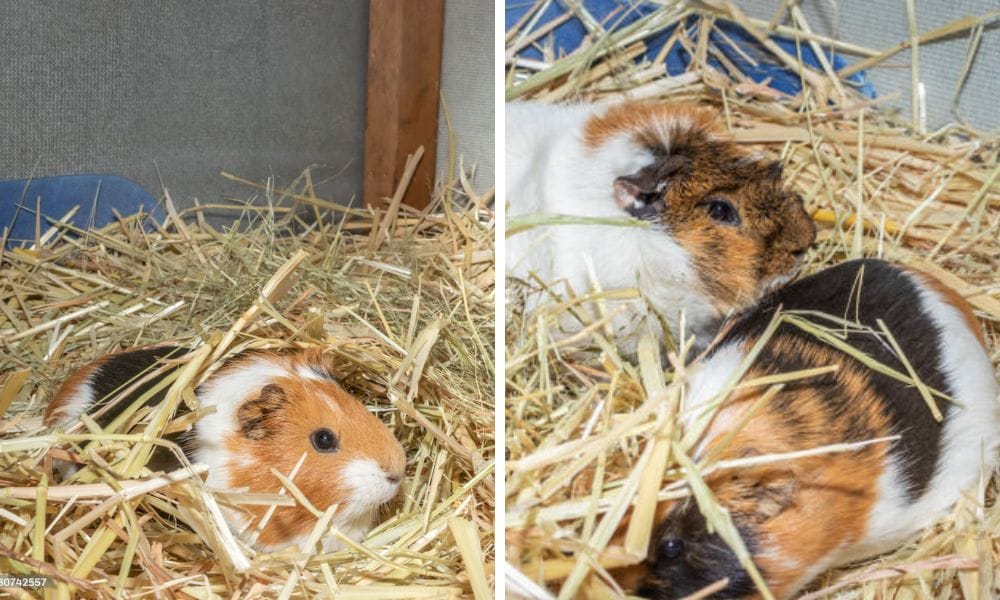
Introducing New Hay Types to Your Guinea Pig
When introducing new hay types to your guinea pig, do so gradually. Mix the new hay with the old to allow your guinea pig to adjust. This can prevent digestive upset and help you gauge your guinea pig’s preference for different hay types. Introducing aromatic botanicals in hay can help entice guinea pigs to eat, especially if they are feeling unwell or bored with their regular diet.
The Role of Hay in Preventing Urinary Issues
The right type of hay can help prevent urinary issues in guinea pigs, such as bladder stones. Grass hays with lower calcium content, like timothy hay, are ideal for maintaining urinary health. Avoiding excessive amounts of high-calcium hays like alfalfa can reduce the risk of stone formation.
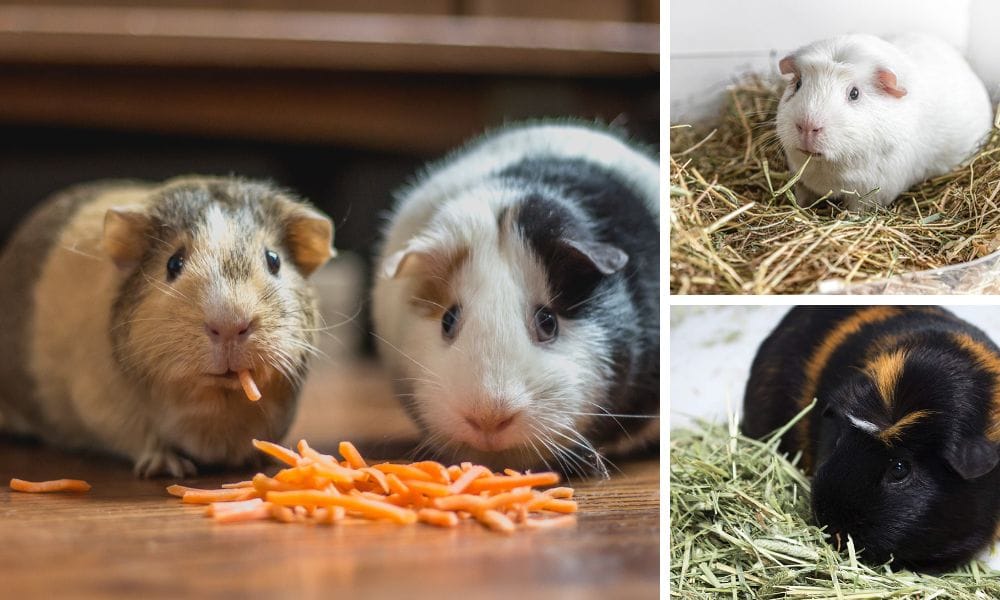
Understanding Hay Cuts: First, Second, and Third Cut
Hay is harvested at different times of the year, resulting in first, second, and third cuts. First cut hay is typically coarser with more stem and seed heads, while second cut is softer with a good balance of leaf to stem. Third cut is even leafier and softer, often preferred by picky eaters but may lack sufficient fiber for optimal dental wear. Each of these cuttings has a unique nutritional profile and fiber content, catering to the dietary needs and preferences of guinea pigs.
Consulting a Veterinarian for Hay Recommendations
If you're unsure about the best hay for your guinea pig, consult a veterinarian. They can provide recommendations based on your guinea pig's specific health needs and dietary requirements. A vet can also help identify any potential health issues that may be influenced by diet.
The Impact of Hay on Cage Cleanliness
Hay can impact the cleanliness of your guinea pig’s cage. Opt for hay racks or feeders to keep hay off the floor, reducing waste and keeping the cage cleaner. This also helps prevent contamination of the hay, ensuring your guinea pig is eating clean, fresh forage. It's crucial to ensure that everything guinea pigs come in contact with, including their hay and habitat materials, is safe and fresh.
Feeding Hay: More Than Just Food
Hay isn’t just food; it’s also a source of entertainment and mental stimulation for guinea pigs. They enjoy foraging and burrowing in their hay, which mimics their natural behavior in the wild. Additionally, hay serves a dual role as both a food source and a hygienic bedding option, which is crucial for the health and comfort of your guinea pig. This can keep your guinea pig happy and engaged in their environment.
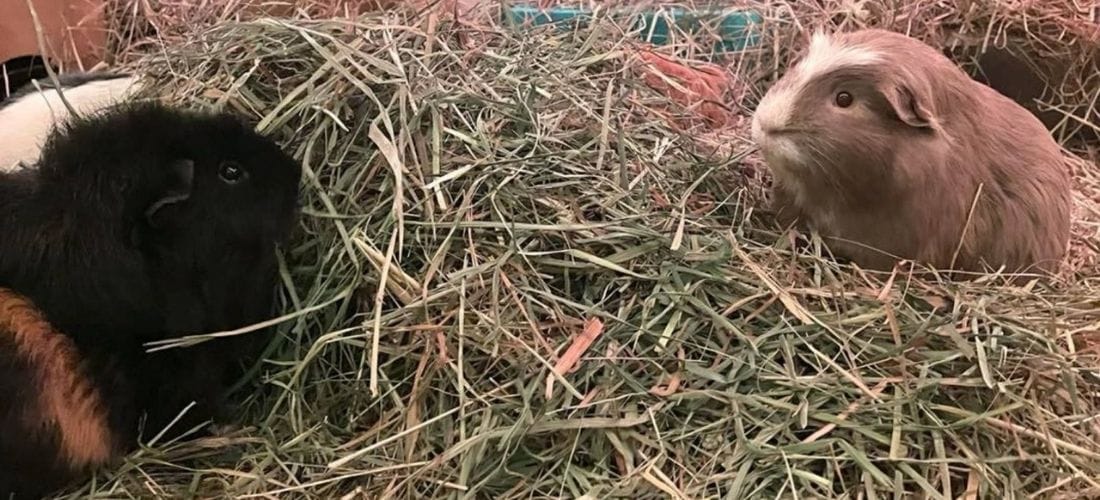
The Social Aspect of Eating Hay
Guinea pigs are social animals, and eating hay can be a communal activity. Providing ample hay encourages social interaction among guinea pigs, which can contribute to their overall well-being. Watching your piggies munch together can also be a delightful experience for pet owners.
Environmental Impact of Hay Production
The production of hay for guinea pigs can have a significant environmental impact. The cultivation of hay crops requires large amounts of water, land, and energy. Additionally, the transportation of hay from farms to stores can contribute to greenhouse gas emissions. As a responsible guinea pig parent, it’s essential to consider the environmental impact of hay production when making purchasing decisions. Look for hay products that are sustainably sourced and have minimal packaging to reduce waste. You can also consider buying hay in bulk or from local farms to reduce the carbon footprint of transportation.
Hay for Guinea Pigs at Different Life Stages
Guinea pigs have different nutritional needs at various stages of their life. For example, baby guinea pigs require a diet rich in protein and calories to support their growth and development. Adult guinea pigs, on the other hand, require a diet rich in fiber and low in protein to maintain their weight and overall health. As guinea pigs age, their dietary needs may change, and they may require more frequent dental checks and a softer hay to chew on. It’s essential to consult with a veterinarian to determine the best diet for your guinea pig based on their age, health, and individual needs.
Common Hay-Related Issues
Guinea pigs can experience various health issues related to hay consumption, including digestive problems, dental issues, and allergies. A common issue is the consumption of too much hay, which can lead to obesity and other health problems. On the other hand, a lack of hay in a guinea pig’s diet can lead to digestive problems and malnutrition. It’s essential to monitor your guinea pig’s hay consumption and adjust their diet accordingly. You should also provide a variety of hay types to prevent boredom and ensure your guinea pig is getting all the necessary nutrients.
Summary
Hay is an indispensable part of a guinea pig's diet, providing the necessary fiber for digestive and dental health, as well as serving as a tool for weight management and preventing health issues. Timothy hay is generally the best choice for adult guinea pigs, while alfalfa hay can be beneficial for younger or pregnant guinea pigs in moderation. Always ensure the hay is fresh, dust-free, and stored properly to maintain its quality. Introduce new hay types gradually and consult a veterinarian for personalized advice. Remember, hay is more than just food; it's a source of enrichment that contributes to a happy and healthy guinea pig.
FAQ Section
Q: How much hay should a guinea pig eat daily?
A: Guinea pigs should have unlimited access to hay, typically consuming an amount roughly equivalent to their body size each day.
Q: Can guinea pigs survive on hay alone?
A: While hay is the most important part of a guinea pig’s diet, they also need vitamin C and other nutrients found in vegetables and specially formulated guinea pig pellets.
Q: Is it okay to feed my guinea pig just one type of hay?
A: It’s best to offer a variety of hay types to provide a balanced diet and prevent boredom. However, timothy hay can be the primary hay due to its nutritional balance and low calcium content.
Q: Why is it important to purchase high-quality hay for guinea pigs?
A: Purchasing high-quality hay ensures that your guinea pig receives fresh and safe food, which is crucial for their health. High-quality hay often comes with a satisfaction guarantee, reinforcing the quality assurance of the product.
In addition we have done all the research for you and put together our list of top 5 high quality hays for guinea pigs you can buy today! Tap the button below to see the list now!

